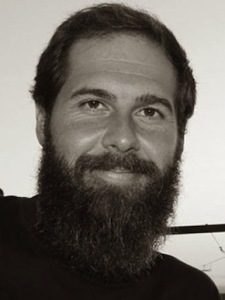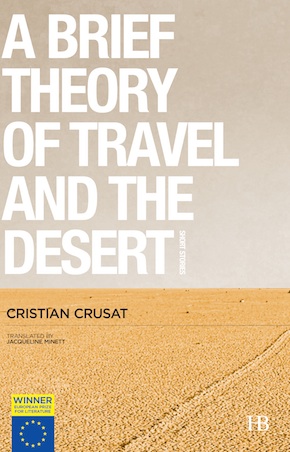Apocalypse never
by Mika Provata-CarloneIn his Brief Theory of Travel and the Desert, skilfully translated with grit and brio by Jacqueline Minett, Cristian Crusat orchestrates a syncopated arrangement of six stories suspended in time and space, relating the experience of being and non-being through stunted snapshots from the lives of disparate, seemingly ordinary and inconsequential characters. Their insignificance, we are meant to feel, reflects our own antipodal era, while a counter-Promethean ‘mystic chord’ supposedly connects vibes, echoes, harmonies and especially dissonances.
1970s-style drifters, tipsily escaping radiation in a world where apocalypse did not happen but merely persisted, vacationing academics, lovelorn, almost incorporeal Balkan writers and their muses and disciples, elderly couples with fading tattoos, young couples trying to find a balance after near-death experiences or encounters of quasi-priapic seduction that never happened, float through this slightly psychedelic, certainly ambitions and self-assured assortment of short stories on a common theme: the unreality of reality itself.
This is a collection that claims for itself a mighty confluence of literary traditions: the decadence of fin de siècle symbolism, its lurid and incendiary mores and verbal fancies, the prominence of the ‘I’ speaking – the ‘I’ of a Verlaine, a de Quincey or a Huysmans – underlie the choice of tone, narrative twists and authorial poise. Schopenhauer’s ethics and aesthetics may have been replaced by a vaguer subliminal incantation of Sufist tenets, yet the sense of a tension between meaning and non-meaning, subsistence and death, the rather languid yearning for a will to live, certainly drive the characters of these stories to their self-representation, definition, erasure. The Beat Generation is brought in, Ginsberg and Burroughs smirk in the wings, Jack Kerouac meets a 21st-century Paul Bowles, while J.D. Salinger and Sartre loom behind the Moon Palaces of Paul Auster. Even Tarkovsky and Milorad Paviç lend momentum to the intended stillness and suspension of both belief and disbelief. Crusat clearly has a gift for absorbing literary echoes, of sensing, tinglingly, atmospheric timbres and linguistic modulations. With A Brief Theory of Travel and the Desert, one could say that he attempts to create a new existentialist vernacular, an ethnic- coloured tapestry of a humanity abandoned to the ebb and flow of its own dazed conscience and of time.
Strewn throughout the texts are bravado displays of virtuosic wordsmithery, muscular pageants of flamboyant imagery, gestures to masters and fellow travellers.”
Crusat’s world is desolate at the same time that it is crowded, full of a sense of miserable dejection, alienating concrete, an unliftable, undefinable weight crushing a vision of presumed errantry, free-spiritedness, boundlessness. This fragmentary, disjunctive world image is framed by a hyperbolic palette of colours, a strong scale of contrast between black and white, which acts as an intensely prescriptive filter that assigns value to impressions and to meaning, tingeing everything with a Polaroid vividness and artificiality. In the first story, we are told that the residents of a campsite lost in a ‘dead zone’ free from wireless service or other technological webbing, are there to convalesce – perhaps from the disease of a world that subsists without existing.
Time is perceived as an impersonal, intangible alien force, somehow providing a structure of virtual reality to an already disembodied yet overwhelmingly materialistic world. ‘Crazy’ becomes in that world the normality of nothingness. Thought, in Crusat’s stories, seems to merely happen, through warped stereotypes, and via nimble nodal connections between dissimilar and not so evidently significant stimuli. Strewn throughout the texts are bravado displays of virtuosic wordsmithery, muscular pageants of flamboyant imagery, gestures to masters and fellow travellers: “the night opens up before me like the rusty zipper on a pair of old 501 jeans”; “a melody that reminds me of the ‘methamphetamine blues’ [sung] by the last human left on earth… He knows that, minute by minute, he is crumbling into dust, and he knows that it is magnificent”; or “the green soaked greenery in a greener green (Nabokov)”.
Crusat aspires to the creation of a 21st-century poetics, to “an idealised love affair between fiction and reality”, where life “gate-crashes” stories. At their best, his stories are striking, fervent juvenilia. The complex figure of self-referential narratives, one could call them quasi-parables, produces a mirror-within-a-mirror reflection of an avatar existence, a symbology in an era when symbols no longer have currency. Grotesque magnification of the minutiae that make up our lives aims to expose the emotional sterility, the total amputation of sentiment and feeling evinced in our world. Crusat boldly gives us an irreverent, scatological transcription of the intellectual and existential void we unconsciously condone and tolerate, an apocalypse past its due date – that perfect fertile ground for any ideology, cult or nihilistic limbo that might claim to fill it with meaning or an ersatz destiny.
Ultimately, however, this is a slightly glorified image of stoical loners, almost a road movie that has been reduced to the stasis of a few excerpted frames. The ironic exaltation of triviality is overshadowed by a certain self-satisfaction, the narrative exhausts itself in the literary gesture, rather than acquiring flesh and blood, the empathy of pain and loneliness, the rawness and rasping sound of true states of the soul. Passages such as “Everything is superimposed on everything else in the clepsydra of time: sadness and sex, death and dream, rest and sand. And so it goes on, always and forever under the influence of the moon and the passing of summers” or statements of the type: “Final hypothesis: our souls are empty but they need movement”, tend to leave behind an aftertaste of spin or of rehearsed, if seemingly powerful, rhetoric. Of millennial ennui.
And it may well be that this is Crusat’s truth. The lack of experience, or the very inability to experience reality or the layered contradictions of life as it happens, is arguably symptomatic of an entire generation – one could call it a New Lost Generation, suspended and virtual, at the same time that it is determined, displaced, recalcitrant and impalpably defiant. This New Lost Generation sadly lacks the richness and depth of experience, the tangible reality of dream and despair that characterised the generation of Fitzgerald or Hemingway, even of Verlaine or Huysmans, of Bowles or Borges. Crusat has an audacious imagination, a flair for suspenseful structure, an instinct for original, unconventional, unpredictable plots. With maturity, with more conscious simplicity and self-examination, one certainly expects some very fine, strong writing in the future.
 Cristian Crusat was born in Spain in 1983 to a Dutch mother and Spanish father. He studied Literature at the Complutense University of Madrid and Linguistics at the International University Menéndez Pelayo of Santander and the Cervantes Institute, and completed a PhD in Comparative Literature at the University of Amsterdam. He is the author of five works of fiction and the ‘non-academic history of biography’ Vidas de Vidas, and has taught and conducted research in Spain, France, The Netherlands and Morocco. A Brief Theory of Travel and the Desert was awarded the Manuel Llano International Prize 2010 and the European Union Prize for Literature 2013. Jacqueline Minett’s translation of the collection is now published by Hispabooks.
Cristian Crusat was born in Spain in 1983 to a Dutch mother and Spanish father. He studied Literature at the Complutense University of Madrid and Linguistics at the International University Menéndez Pelayo of Santander and the Cervantes Institute, and completed a PhD in Comparative Literature at the University of Amsterdam. He is the author of five works of fiction and the ‘non-academic history of biography’ Vidas de Vidas, and has taught and conducted research in Spain, France, The Netherlands and Morocco. A Brief Theory of Travel and the Desert was awarded the Manuel Llano International Prize 2010 and the European Union Prize for Literature 2013. Jacqueline Minett’s translation of the collection is now published by Hispabooks.
Read more.
cristiancrusat.com
Jacqueline Minett is a professor in the Faculty of Translation and Interpretation at the Autonomous University of Barcelona, where she also serves as Associate Dean for Academic Affairs. She translates from Spanish, French and Catalan.
Mika Provata-Carlone is an independent scholar, translator, editor and illustrator, and a contributing editor to Bookanista. She has a doctorate from Princeton University and lives and works in London.


